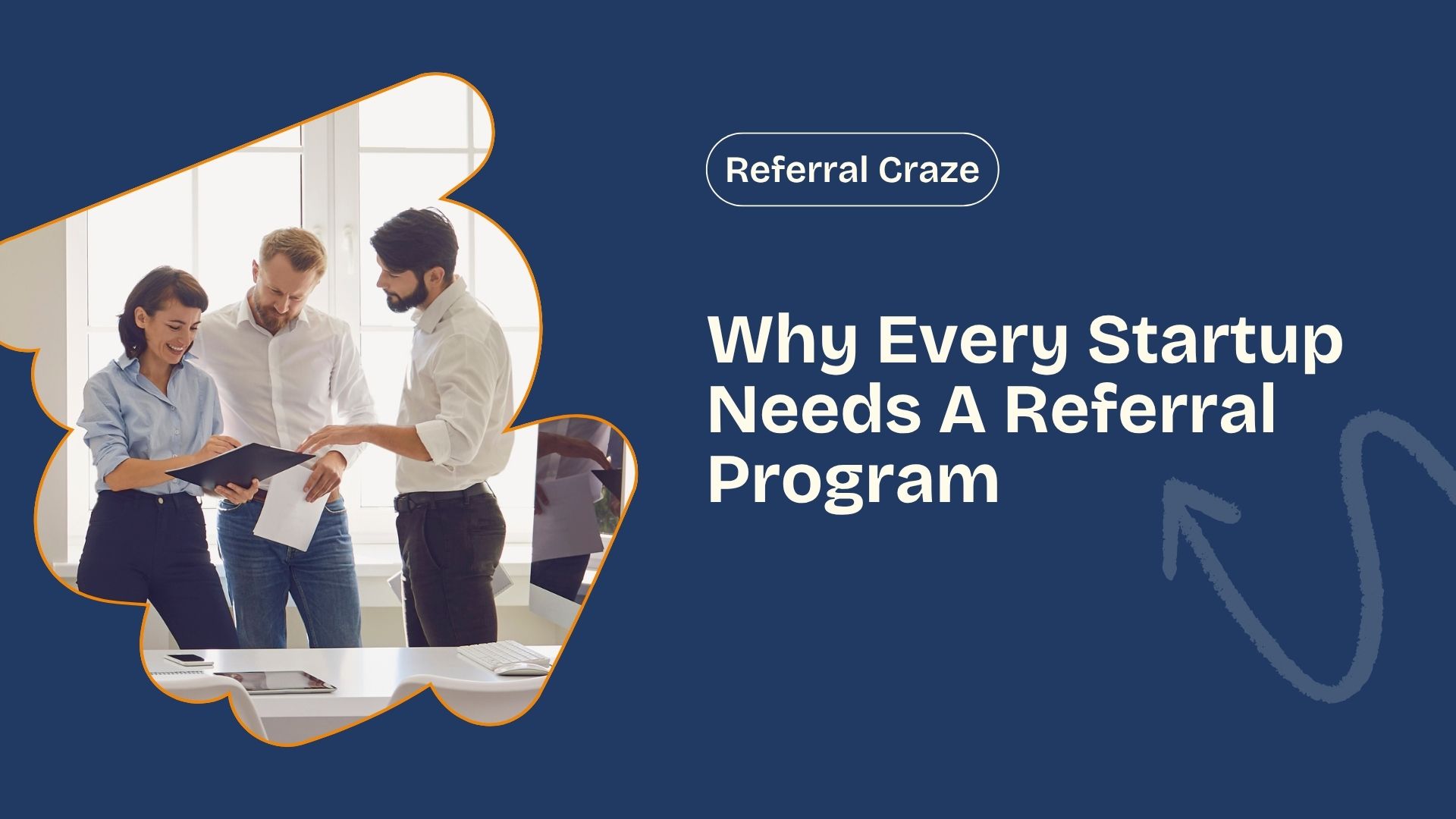Building a successful startup is never an easy task. While you focus on refining your product, getting funding and engaging in memorable branding exercises, there is an often-overlooked mechanism that has the potential to truly accelerate success: a real referral program. For example, encouraging our most loyal customers to spread the message can affect your company for years to come–having grown steadily year after year and suggesting slow growth rates in general.
But what exactly is a referral program, and why is it so important for startups? Why should it be an essential part of every startup’s plan—to help it grow rapidly and sustainably?
The Value of Word-of-Mouth Marketing
Word-of-mouth marketing will never go out of style. Think about it–we often trust sponsored advertisements more firmly than recommendations from our friends and family. For startups, this trust factor can be a deal breaker in getting a foot in the door of credibility.
Nielsen found that 92% of people trust recommendations from peers over traditional advertising. So referrals born from real customer experiences-carry more credibility than paid ads or cold outreach, especially for a startup without a well-known brand name. A really effective referral program can help bridge that credibility gap and turn satisfied customers into your most effective sales force.
Startups and the Power of Trust
For startups, trust is everything. Unlike established companies which have reputations built on years of diligent effort and social proofing, a new business can’t afford mistakes in this area. A referral program serves to build trust by exploiting one simple idea: people trust people. When a friend or family member speaks favorably about your product, they provide validation that others will try it.
For example, Airbnb implemented a referral program in the early stages of its development that rewarded users for recruiting their friends and relatives. This helped increase their user base and encouraged trust in first-time users when they saw that people they knew were recommending it.
Why Startups Need a Referral Program

Company has only just begun to gather data and refine its proposition, but is seeing positive impact Frederiksen: Right now we’re focusing on scaling so we can maximise our potential. There are only five developers in Malaysian tech park As for what the future holds, Chen anticipates that once we release Android version it will be downloaded by a much larger number.
On a bootstrapped budget, or with the limitation of resources that new companies often face, startups need ways to acquire customers, build brand loyalty and scale up which are both cost-effective and highly effective. A referral program satisfies all these requirements!
Customers Also Drawn from Referrals
Start-ups frequently find it hard to attract customers without wrecking their marketing budget. In fact, a referral program is an ideal way for a startup looking for new customer to profitably cost effectively reach them. You have already got your customer base tell other people. Instead of spending those advertising dollars, reward your current customers to do the work for you.
Simple incentives, like discounts and free credit happens consumers can use in product.
Dropbox, for example, offered extra storage space to people who signed up other users for their priority service For this reason, they also made a powerful case for protection.
Referred People Bring a Higher Lifetime Value (LTV)
Referral customers tend to stick around turn into more loyal and engaging over time. A study showed that a referral customer’s lifetime value is 16% higher than that of one acquired in other ways. Because they’re more likely to remain with you after meeting your service through a trusted confidant.
When you’re trying to build a business model that depends on recurring revenue, as with SaaS products, having a high-LTV customer pool is essential to your long-term profitability and success. Studies say referral customers have 16% higher LTV, which you can track using metrics from Referral Marketing Metrics That Matter in the Craze Era.
Enhanced Customer Loyalty and Engagement
A referral programme is not only attracts new customers for you; it chases away last’s old ones by giving them gifts. If you acknowledge how loyal (n3–n80) to your company these advocates are and repay that loyalty out of respect for its customers, consistency in years to come, thousands more will surely follow!
Happy customers who benefit from your referral scheme are more likely to pump their enthusiasm back into promoting your brand. That means positive feedback loops of loyalty, recommendations, and business have grown in the past.
Organic Growth Through Network Effects
Your referral program is not six degrees of separation. A referred customer is now actually a potential referrer themselves. Once program one has gotten off on the right foot, as in because we are all acquainted already around here, and you gave it a little push by referring to please start sending some money our way, etc, then its network effects will take care of everything else for that matter.
Uber famously expanded into cities worldwide by cashing in on its referral program. Everyone who brought a new passenger or driver to the platform–with cash in hand and credit roll-over dollars on their account as well–helped drive its rapid growth abroad.
Tracking and Optimization Opportunities
Referral programs aren’t just good for growth; they also provide an awesome way to collect customer intelligence. By monitoring who is doing the business, which incentives bring good results and what kind of customers are most active, you wind up with data that can help improve your marketing performance.
For example, if you find out that certain age groups are referring more actively following receipt of a particular bonus, you can tune your program to serve them. This kind of fine-tuning makes sure your referral program continues effectively and is relevant over the long term.
How to Create an Effective Referral Program
Step 1: Know Your Audience
First, Find Your Focus: Before you set up a referral program, define and study your customers. What reasons will they refer friends? Consider their demographics, behavior patterns and pain points. Use questionnaires, polls and customer feedback to find out what kind of incentive they would value most.
Step 2: Easy to Understand, Easy to Use
Confounding users with complicated sign-up procedures or abstract benefits will interfere with their willingness to participate in your referral program. The key is to keep the program simple and straightforward. Clarify its incentive system (e.g., “Refer a friend and both of you get $10 off!”) and give detailed steps for how to participate.
Step 3: Attractive Incentives
Choose rewards that fit your target market’s interests. Discounts, cash rewards, free service for a month or special favors often work well. For example, if you are a fitness start-up business, start offering free fitness classes or snacks decked out in your company logo. The trick is to make the reward valuable enough to spur people on to action.
Step 4: Publicize the Program
In no way is a referral program going to get underway unless your customers know about it. Promote the program by putting banners on your website, using e-mail campaigns, and through social media. With creative copy and visuals, make it conspicuous to encourage customers to distribute their referral links far and wide.
Step 5: Use Technology to Automate
With all the details and information that you need to keep track of, doing everything manually can be a big bother. Use technology to automate your program. Tools like ReferralCandy, Referral SaaSquatch, or even custom integrations with platforms such as Zapier will keep track of referrals, dole out rewards and provide insights.
Step 6: Continually Refine and Improve
Even Referral programs do not simply “configure it and forget it.” You have to keep a close watch on their performance. Which customers are making the most referrals? What rewards work better for others? Use this data to make changes and keep the program effective.
Building a Community of Advocates
A referral program is not just about finding new customers. It’s also about creating a community of brand advocates who are passionate about your business. Your mission is to convert customers into ambassadors who feel your start-up enjoys the great success they do theirs.
When you give them rewards and say thanks for all of their participation, the outcome is that they stay with you longer, spend more, and help in every way to grow your company. It’s win-win for everybody concerned.
Get Your Referral Program Started Today
A referral program is as important for a startup as anything else. Not only does it help the company gain a cost-effective and scalable way to attract new customers, but it also deepens relationships, improves loyalty and powers major growth. Regardless of whether with technology or traditional business, referrals are your start-up’s secret weapon.
There’s no need to be daunted by a referral program. Start small, play around a bit, and as things grow, then venture larger. The most important part of the process is simply getting started.
Final Note
For more strategies to grow your startup, sign up for our newsletter and get insights on where you can succeed.
Turn happy customers into growth engines.
Read: The Complete Guide to Customer Referral Marketing







